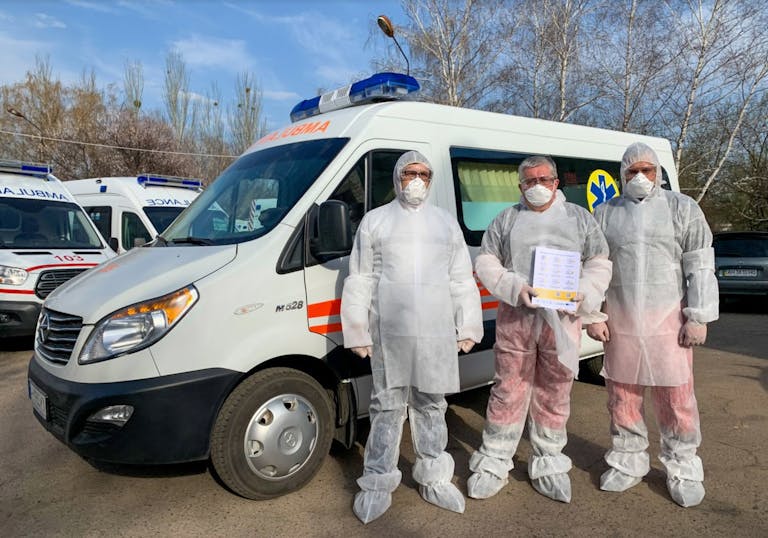For many of us, the COVID-19 pandemic seemed like a moderately containable outbreak in its early stages.
Fast forward just two months later, with the U.S. Surgeon General’s announcement that this second week of April could be the “hardest and the saddest…of most Americans’ lives.”
Yet behind the scenes and escalating policies, health workers have been working tirelessly on the frontlines since the first cases appeared.
During an unprecedented global pandemic, World Health Worker Week falls this year from April 5-11. In moments of uncertainty about our health and our futures, we honor and thank the heroes on the frontlines who are seeing the pandemic in real time and putting their lives at risk to save others and keep us healthy.
Now more than ever, healthcare professionals face increasing rates of infection and endure back-to-back overtime shifts as they work to detect, treat, and prevent COVID-19 infection and illness, as well as managing other diseases and chronic conditions. In addition to physical and mental exhaustion, frontline health workers are also being targeted and harassed as a result of misinformation and mass fear of the virus.

Despite global panic, there are many around the world who recognize the clinical care these frontline health professionals are providing amid impossible circumstances, often sacrificing their ability to be with their loved ones. Around the world, there have been global movements of “thank-you hours” where people cheer on health workers nightly, as they continue to selflessly work in increasingly grave conditions.
Leaders on the Line
The novel coronavirus pandemic has upended our world and continues to bring about drastic socioeconomic and political consequences. Health workers are a critical part of mitigating public health consequences. The virological aspects of SARS-CoV-2 make it astonishingly easy to transmit and difficult for providers to manage once patients are in critical condition. Health workers – those who deliver healthcare and health services either directly or indirectly – have always faced everyday workplace challenges. They also deal with job insecurity, low working conditions, and underinvestment in their training. 70 percent of the global health workforce are women, yet only a quarter of these women hold senior leadership positions. Nurses and midwives are often the only link for health services for people in low- and middle-income countries, accounting for nearly half of the global health workforce and serving a crucial role in delivering primary care and emergency treatment.
Truly on the front lines, they were often the first to observe the unique clinical characteristics of this novel virus, giving health officials, policymakers, and the general public invaluable guidance. As the pandemic evolves, the health workforce continues to respond, give advice, and be the backbone of health systems.
Strong health systems protect us from public health threats
We’ve heard time and time again that diseases do not respect borders. COVID-19 has certainly not spared wealthy regions, with the United States, Italy, Spain, the United Kingdom being some of the hardest hit countries. The U.S., in just two months, became the new epicenter of the pandemic, despite having one of the most expensive and advanced health care systems. Will ill-equipped and poorly staffed facilities be able to cope with the escalating demands of a novel respiratory disease for which there is currently no vaccine? Resilient and adaptive health systems are essential to ensure that hospitals and clinics can function not only during normal times, but also in times of health crises. We often think that health systems strengthening applies to low- or middle-income settings, but we’ve seen in both Italy and the U.S. that unprepared health systems have led to a lack of personal protective equipment, delays in diagnostic testing, and overwhelmed hospitals.
As one physician said, “for the first time in my career, I am afraid.” Many providers have opened up about the increasingly apocalyptic scenes inside New York hospitals: lack of ventilators, difficult decisions with triage, and overflowing morgues. Health systems strengthening is not an external issue. It is sorely needed in America, where lack of timely action and funding have hampered an effective response that could have mitigated the various struggles we are all experiencing.
Heroes working in your community
Frontline health workers are heroes — but they are also just like us. They are afraid of getting infected, they are worried about the health of their loved ones, and are uncertain of the long-lasting socioeconomic impacts of this pandemic. As we end this challenging week, listen to the stories of brave health workers that shine through bleak news reports. In our global and local communities, we are going to encounter more hard lessons along the way. If we want to look forward and rebuild our lives and our societies, we need to critically think about investing in resilient health systems. As individuals, we need to be acutely aware of how public health threats affect our own health outcomes and/or our livelihoods.
During this time of physical distancing, let’s lean on each other and continue to heed evolving public health advice. Investing in health workers is important, now in the midst of COVID-19, as much as it will be post-pandemic. Health workers, on a normal day, work hard to deliver quality healthcare. In these extraordinary times, they continue to dedicate themselves to treating diseases and alleviating suffering. Their contributions to you and our communities should not be invisible.
Resilient health systems are driven by a highly skilled health workforce. If you want to do more to support frontline health workers, donate to the COVID-19 Solidarity Response Fund, which helps provide critical training and personal protective equipment for health worker heroes.
Top photo Caption: A woman works in personal protective equipment (PPE) at a Moldovan hospital. Photo: WHO Moldova/Dinu Bubulici
donate today
Every donation makes a difference. Support WHO’s life-saving efforts to respond to the COVID-19 pandemic by giving to the COVID-19 Solidarity Response Fund. Donations made via Facebook will be matched up to $10,000,000. Through June 30, 2020, for every $1 you donate here, Google.org will donate $2, up to $5,000,000.



 View All Blog Posts
View All Blog Posts



